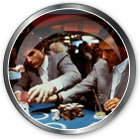Winning Blackjack Strategies
Wednesday, July 17th, 2013
Posted by Roger
Although knowing what basic strategy is and how to use it in blackjack is essential, it's not the whole picture. You will feel a lot more comfortable playing your hand if you understand a bit about the game. Blackjack strategy beyond the charts and tables includes aspects such as bankroll management, systematic approaches, learning to use your gut, and knowing what not to do.
Manage Your Bankroll
Let's start with bankroll management, as it is likely the most important thing to think about. Of course most people want to jump right into card counting, the system of systems. But you won't become a rich blackjack player counting cards if you don't know the golden trick called walking away up.
Test Your Blackjack Strategies at These Online Casinos
Setting a Loss Limit
Managing your bankroll simply means paying it some attention. Too many people go out for a night at the casino with a couple of hundred dollars in pocket, and consider it their casual bankroll. It's much more effective to pick a number and be well aware of it. Two hundred dollars is fine (you should be playing small denomination tables if that's your bankroll, but it's enough) but you have to know it's your bankroll. That means, when that money runs out, you wont go to the bank machine and get more. This is called a 'loss limit', meaning you know at which point you've lost enough to stop playing for the night. Many people don't like the idea of loss limits, thinking at the end of the night it's best to go for broke and try to make up what you've lost. In the long run though, it's better to simply know what you can afford to lose, and try hard to not lose any more than that.
Stick to Your Win Limit
Loss limits are the first of a two-sided strategy. The compliment to loss limits are 'win limits'. The concept of win limits is also foreign to many gamblers, simply because it makes little sense to stop playing if you're on a win streak. This may be true, but it's also true that every win streak must come to an end. If you're up a significant amount you should walk away. What is a significant amount though? Obviously that amount varies from player to player, but walking away with your bankroll 25% up is usually considered a good night.
So before you go to the table, set a win and loss limit. The loss limit may be your entire bankroll if you're just playing blackjack, and the win limit should be a percentage of your bankroll that you'll feel happy winning. Incorporating this simple bankroll blackjack strategy into your play and you'll never lose more than you feel comfortable with. Better yet if you find yourself up a good deal, following this strategy, you wont have to watch yourself lose that recently acquired cash. Giving back what you've just won is never a fun experience. Learn to walk away with the win!
Busting Cards and Player Smarts
Often quoted is the statement that 'blackjack is a game of skill'. Rarely though, do people explain what that skill is, and how to develop it. Basically, we want to develop the skill to be as aware as possible of the consequences of our decisions to hit stand, split, or double down.
To do this we simply need to be able to take in as much of the information the table makes available to us. Short of card counting (keeping track of what has left the deck) the information we get is all laid out on the table when it's time to make our decision. We can see our own cards, the other player's cards, and one of the dealer's cards.
The dealer's up-card, in combination with your own total, should be all you need to come to your decision. It's obvious when the dealer has a strong up-card that we should be hitting our weak totals, but sometimes it's not as obvious why basic strategy suggests a hit or a stand.
Take for instance, an initial total of 12 and the dealer has an up-card of 6. Should you hit or stand? Basic strategy suggests you stand, but as you may well know, a great number of people will hit anyway. Remember the rules the dealer has to follow, including the one where they must hit on any total below seventeen.
If the dealer has a six showing, and has a 10 value hole-card (we don't know that for certain) they will be stuck with 16 and have to hit. Since there are more cards in the shoe that will bust a total of sixteen than there those that would strengthen it, we could presume the dealer is likely going to bust. The same is true for a total of 15, or 14, in addition to 16. When the dealer is showing a 4, 5, or 6, they are said to be showing 'busting cards', because mathematically (in accordance to the rules a dealer has to follow) there is a better chance of them busting than not busting.
When the dealer is showing these busting cards, the most intelligent thing to do when you are dealt a 12 is to stand. It's a little counter-intuitive, since a 12 is such a weak hand we are inclined to hit it against almost any dealer hand. Statistically though, you will win more or lose less by standing on a 12 against a 6.
The concept of dealers busting cards is vitally important in the world of blackjack. No strategy is complete, and no approach is valid, unless they take into account the importance of the dealer showing busting cards.






